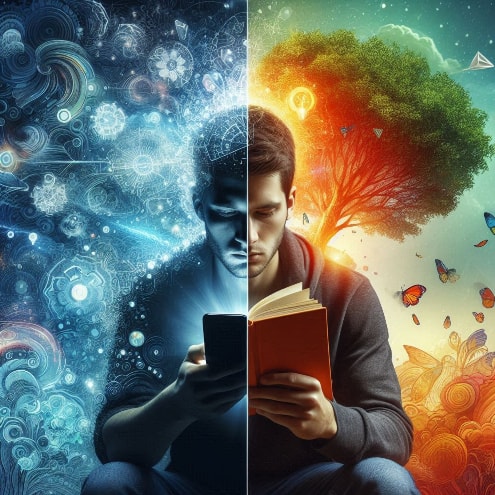India faces a silent saboteur: excessive screen time causing "brain rot." This piece explores how digital overuse dulls minds, shrinking attention spans and impacting memory. Learn mindful tech use strategies to reclaim mental clarity and protect India's cognitive vitality.

As India rapidly scales new digital frontiers, a profound and largely unseen challenge is emerging: the cognitive toll of our hyper-connected lives. On July 22, World Brain Day, under the critical theme "Brain Health for All Ages", it's imperative for a nation defined by its burgeoning youth and technological ambition to confront a growing concern – a phenomenon aptly described as "brain rot". This term, once metaphorical, gained prominence, even becoming Oxford's Word of the Year for 2024, reflecting growing public awareness and anxiety. The term captures a real phenomenon—where attention spans shrink, memory falters, and emotional resilience wears thin—often without us even noticing.
The Digital Dilemma: Connectivity Versus Cognitive Decline
Smartphones, tablets, and other digital screens have become essential tools in our daily lives, offering entertainment, information, and seamless connectivity. However, as individuals incessantly tap, swipe, and scroll through vast streams of content, experts warn that our digital behaviours may gradually undermine brain health.
While technology has significantly expanded access to information and transformed learning and communication, its overuse – especially with low-quality content – correlates with various cognitive issues. While digital access has brought immense benefits, including remote learning, health apps, and language acquisition tools, overuse and passive content exposure come with hidden costs. Recent reviews and studies indicate that individuals, particularly adolescents and young adults, with excessive digital consumption increasingly experience negative symptoms. These include: diminished attention, impaired memory, impaired decision-making, emotional numbness, and increased anxiety. Research shows that frequently consuming quick content like TikTok and social media triggers dopamine responses in the brain, creating a craving for instant gratification. This, in turn, weakens our ability to plan and manage emotions effectively.
Two concerning behaviours have surfaced: doomscrolling, the habit of obsessively reading negative news, and zombie scrolling, where people mindlessly browse digital content. Both lead to cognitive overload, making it hard for the brain to handle important information, and often causing emotional exhaustion and heightened anxiety. While cognitive problems from too much screen time affect all ages, younger people are especially vulnerable. Older adults also use digital devices more, which can lead to less physical activity and socialising, harming their brain health. This can cause issues like irritability and trouble concentrating, affecting work and personal relationships.
Reclaiming Mental Clarity: What We Can Do
It's crucial to recognise that technology itself isn't inherently harmful; it can even enhance cognition and creativity. However, the manner of usage is crucial. Experts recommend a mindful approach to digital engagement, focusing on quality over quantity. Improving brain health doesn't require abandoning technology—it requires using it wisely. Experts recommend the following approaches:
Screen time management is a first step. Use wellness apps to set limits, especially before bedtime, to prevent mental fatigue and poor sleep.
Be selective with content. Unfollow accounts that create anxiety and seek material that enriches, educates, or inspires.
Engage in physical and creative offline activities like reading, walking, painting, or yoga. These not only refresh attention but improve emotional well-being.
Prioritise deep work by setting aside distraction-free time for tasks requiring sustained concentration.
Interact socially—in-person or even over calls. Human connection sharpens emotional intelligence.
Teach digital hygiene to youth. Early habits shape lifelong brain function. Encourage breaks, balance, and conscious use.
When technology is used with awareness and limits, it can support brain development and lifelong learning. Gamified memory tools and adaptive learning platforms show promise when balanced with rest and real-world engagement.
A Wake-Up Call for India
Unchecked digital distraction can harm both individuals and society. When people are constantly influenced by algorithm-driven content, they find it harder to recognise the truth, consider different viewpoints, and make informed choices. This year's World Brain Day theme reminds us that brain health isn’t just a personal concern—it’s of prime public importance. For a diverse democracy like India, where informed public discourse is paramount, unchecked digital distraction and the resulting cognitive decline pose a direct threat to critical thinking and social cohesion. When minds are dulled by endless scrolling, the ability to discern truth, engage in nuanced debate, and make collective progress is severely compromised. It also weakens democratic processes, as citizens may become more reactive and less reflective—a worrying trend in a society that thrives on dialogue, diversity, and dissent.
India's much-touted demographic dividend hinges on the cognitive vitality of its youth. Yet, if unchecked, the "silent saboteur" of excessive digital consumption could transform this asset into a liability, robbing a generation of its full intellectual potential. A healthier brain at every age means a stronger, more compassionate, and more resilient society.
In the pursuit of convenience and connectivity, we must not forget our most valuable asset: the human brain. On World Brain Day, let's promise to take care of our minds instead of dulling them. Digital tools should serve us, not enslave us. Let us reduce endless taps and swipes, and instead choose to think, create, and connect. India’s future—rooted in innovation, compassion, and wisdom—depends not just on digital speed, but on mental clarity.
( Views expressed are personal.)
Dr. K. Madan Gopal is a Health Sector Expert and currently works as Advisor with Public Health Division of National Health Systems Resource Centre, New Delhi, and Prof. Dr. Bindu Menon is a consultant neurologist at Apollo Hospitals, Nellore and Secretary General of the Indian Epilepsy Association.
By continuing you agree to our Privacy Policy & Terms & Conditions
